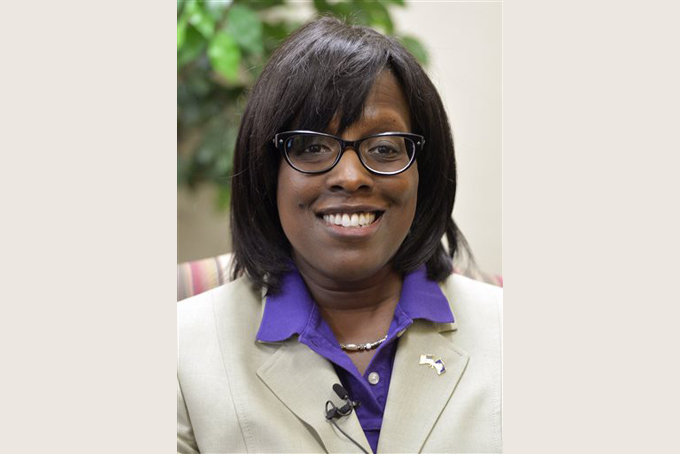
FRANKFORT, Ky. (AP) _ Growing up in Detroit, in the years when she had a television, Jenean Hampton would use pancakes to bribe her friends to watch NASA astronauts leave this fuzzy black-and-white earth behind.
The near-sighted kid of divorced parents in one of the country’s largest cities buried herself in science fiction books and dreamed of escaping poverty to travel in space.
“I remember I was not as excited by the first Black astronaut or the first female astronaut, I was excited by the first astronaut who wore glasses,” she said. “Because that meant I had a shot at it.”
Hampton never made it to space, but she did rise from an unemployed tea party activist who couldn’t win a state House race to become the first African-American to ever hold statewide office in Kentucky. Elected lieutenant governor alongside Republican Gov.-elect Matt Bevin, she joins Republican U.S. Sen. Tim Scott of South Carolina as the only Black statewide elected officials in the South.
Republicans view her election as a rebuke to claims by some Democrats that President Barack Obama’s dismal approval ratings in the state are driven by race. Kentucky’s minority population is less than 10 percent, and the state had divided loyalties during the Civil War while never officially joining the Confederacy. The state Capitol has statues of both Abraham Lincoln and Confederate President Jefferson Davis in its rotunda.
But Hampton downplays her race, choosing to identify as a political outsider during a season of momentous change in politics in Kentucky.
“I’m aware of the historic significance. I get that. A lot of people are excited about that,” she said. “I’m probably more excited at the chance to encourage others, other non-politicians, to get into the game.”
Hampton was born in Detroit in 1958, where she and her three sisters were raised by their mother after her parents divorced when she was 7. She made good grades in school but said she was “pressured to fail” by other Black kids who accused her of “trying to be White.” But Hampton now says she sees that same dynamic with White families in Kentucky’s poor counties.
“These kids that made fun of my good grades, made fun of the way I spoke, the fact that I was reading all the time, even when a book report wasn’t required, even my choice in music,” she said. “I just remember wondering, at what point in my life would I get to just be Jenean, with my own likes and dislikes?”
Hampton left her home, spending seven years as an officer in the Air Force, including a deployment during Operation Desert Storm in the early 1990s. She met her husband in the Air Force, and his assignments included emergency medical operations for the space shuttle at Patrick Air Force base. Hampton said that brought her close to the rockets that shaped the dreams of her childhood.
She lost her sales job in 2012 and decided to spend her free time volunteering for political causes, becoming active in the state’s tea party movement. She challenged the former Speaker of the Kentucky House of Representatives in 2014 and lost badly.
Growing up, Hampton’s family was poor and often received government services. But the experience later led Hampton to join the tea party movement, where she quickly found a home for policy views shaped by watching her mother interact with social services. She said she wished the workers would have helped her mother get a GED, teach her valuable job skills and help her practice interviewing.
“I just didn’t see how they were helping her,” Hampton said. “It just made me aware, or made me question, are we truly, truly helping people if all we are giving them is a check?”
Her views have put her at odds with the state’s Black leaders, including the Kentucky chapter of the NAACP, who say government has a constructive role in helping pull Black people out of poverty. Hampton opposes raising the minimum wage, the expansion of Medicaid under the federal Affordable Care Act and the Common Core educational standards that Kentucky and other states have adopted.
“Affordable health care, not only helps African-Americans, it helps those who have not had health care coverage in the past,” Kentucky NAACP President Raul Cunningham said. “I don’t think she will help African-American causes.”
She also has questioned the authority of the U.S. Supreme Court, saying in a debate earlier this year she wondered if it “is the final arbiter on anything,” adding: “If that were true, I would still be a slave.”
Other Black leaders, including Pastor Jerry Stephenson in Louisville’s West End community, have praised Hampton for her support of charter schools, which the NAACP opposes because leaders say it would drain resources from public education.
“That is one of the greatest gifts she can give to not only the children of color but to every child,” Stephenson said.
Hampton dismissed Cunningham’s criticism, saying she tends “not to see color” and will promote policies that help everyone.
“I don’t have a special definition of freedom and liberty because I’m Black,” she said. “We will be focused on improving opportunity for all Kentuckians, not just one subset.”
